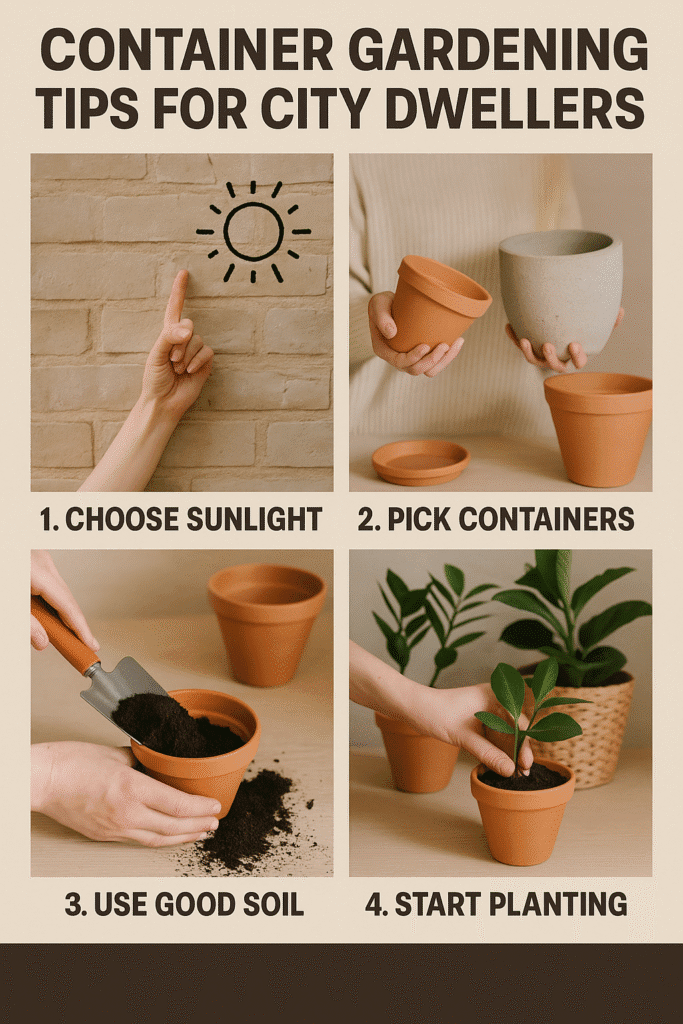Living in a city doesn’t mean giving up the joy of gardening. In fact, container gardening for city dwellers is one of the most flexible, space-saving ways to enjoy plants in small apartments, balconies, rooftops, and patios. Whether you’re looking to grow herbs, vegetables, or ornamental plants, this guide will walk you through everything you need to know.
Why Container Gardening Is Ideal for Urban Living
Container gardening adapts perfectly to city environments. It allows you to:
- Maximize limited space
- Move plants to adjust for light and weather
- Grow plants without needing a backyard
- Beautify your home or balcony
With just a few pots and some creativity, you can build a lush oasis in the heart of the city.
Choosing the Right Containers
Materials
Containers come in different materials such as:
- Plastic: Lightweight, affordable, but may degrade under sun.
- Ceramic or Terracotta: Attractive but heavier and fragile.
- Metal: Durable but can get very hot.
- Wood: Natural look, but needs treatment to resist rot.
Size and Drainage
Always ensure your containers:
- Have drainage holes
- Match the root depth of your chosen plants
- Are sized appropriately to prevent crowding
Best Plants for Container Gardening
Some plants thrive particularly well in containers, including:
- Herbs: Basil, parsley, thyme, mint
- Leafy greens: Lettuce, spinach, kale
- Root veggies: Radishes, carrots in deep pots
- Flowers: Marigolds, petunias, pansies
- Succulents: Low-maintenance and decorative
Pro Tip: Choose dwarf or compact varieties for better space efficiency.
Soil and Fertilizer: Getting the Mix Right
Avoid garden soil. Instead, use potting mix, which is:
- Lightweight
- Well-draining
- Rich in nutrients
Fertilizing Tips:
- Use slow-release pellets or liquid fertilizer
- Feed every 2–4 weeks depending on the plant
- Don’t over-fertilize—this can harm roots
Watering Smartly in Urban Settings
How to Water:
- Water early in the morning or late in the afternoon
- Check moisture with your finger: if top 1 inch is dry, it’s time
- Water deeply until excess runs out
Common Mistakes:
- Overwatering due to lack of drainage
- Using containers that dry out too quickly
Install self-watering planters or use water-retaining crystals for better efficiency.
Making the Most of Small Spaces
Vertical Gardening
- Use wall planters or tiered shelves
- Hang pots on balcony rails or fences
Mobile Gardens
- Use containers with wheels for easy repositioning
- Helps optimize sunlight exposure
Companion Planting
Grow compatible plants in the same pot:
- Basil + tomato
- Lettuce + radishes
- Mint + peas (in separate containers due to mint’s invasiveness)
Seasonal Maintenance and Tips
- Spring: Refresh soil and plant new crops
- Summer: Monitor water levels and provide shade for sensitive plants
- Fall: Harvest herbs and veggies; prepare plants for cooler weather
- Winter: Bring tropical plants indoors or cover containers for protection
Clean your containers between seasons to prevent disease.

Creative Container Ideas for Urban Dwellers
Think outside the box with these recycled container ideas:
- Old buckets
- Wooden crates
- Hanging shoe organizers
- Plastic bottles
Use your imagination to design a personalized garden with low-cost, eco-friendly options.
For more inspiration on transforming your balcony into a green haven, check out our guide on creating a lush garden on your apartment balcony.
Conclusion
Container gardening gives city dwellers the freedom to create green, productive spaces regardless of square footage. With the right containers, soil, and a little creativity, anyone can grow a vibrant garden right from their window, balcony, or rooftop.
Save this guide for your next planting weekend or share it with a friend who’s just starting out!
FAQ
Q: Can I grow vegetables in containers on a balcony?
A: Absolutely! Just ensure the containers are deep enough and placed in a sunny spot.
Q: How often should I water my potted plants?
A: It depends on the weather, container type, and plant. In summer, daily watering may be necessary.
Q: What’s the best soil for containers?
A: Use high-quality potting mix—never garden soil, which compacts and holds too much water.
You can purchase self-watering planters and compact vertical gardening kits here on Amazon to get started with your urban garden.
Written by Kate Smith | Plant Care Enthusiast & Urban Gardener
